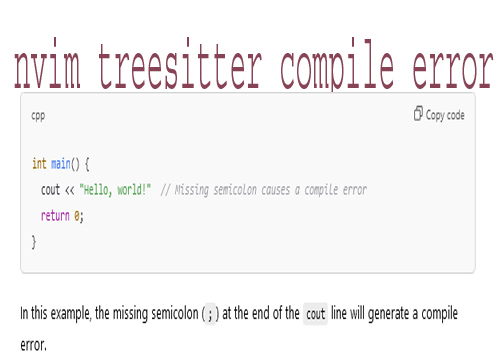How to Fix nvim treesitter compile error and Other Common Compiler Errors
Understanding compile errors is crucial for developers, whether you're coding in C++, Java, or any other programming language. This article will explore what compile errors are, how to fix them, what causes compiler errors, and the differences between compile and runtime errors. We will also look at how to solve
nvim treesitter compile error, a common issue in Neovim when using Tree-sitter.
What is a Compile Error Example?
A
compile error occurs when the compiler cannot translate the source code into machine code because of mistakes in the code. For example, in C++:

How Do I Fix Compile Error?
To fix a
compile error, you need to review the error message provided by the compiler and address the underlying issue. This can involve correcting syntax mistakes, ensuring proper use of data types, and fixing missing or incorrect references.
For example, if you encounter an
nvim treesitter compile error, you can fix it by updating or reinstalling Tree-sitter modules or checking if your configuration is
properly set up.
Steps to Fix Compile Errors:
- Review the compiler error message.
- Locate the source of the problem in the code.
- Correct the issue, such as syntax errors or missing libraries.
- Recompile the program to check if the error is resolved.
What Causes a Compiler Error?
Compiler errors occur due to issues in the code that prevent it from being converted into machine code. Common causes include:
- Syntax errors (e.g., missing semicolons or braces).
- Type mismatches (e.g., assigning a string to an integer).
- Missing libraries or dependencies.
- Unresolved references (e.g., using an undeclared variable).
What is a Compile and Runtime Error?
A
compile error occurs when the code fails to compile due to syntax or semantic issues. These errors prevent the program from being executed at all.
A
runtime error, on the other hand, happens after the program has been successfully compiled and is running. Examples include division by zero or trying to access an invalid memory location.
What is Compile vs Build Error?
- Compile error occurs when the source code cannot be translated into executable code due to issues in the code syntax or structure.
- Build error refers to problems during the process of compiling, linking, and assembling the code into an executable. This might include missing files or incorrect project configurations.
What is the Difference Between Compile and Execute?
- Compile refers to the process of translating source code into machine code.
- Execute refers to running the compiled machine code on a computer to perform the desired tasks.
In other words,
compiling transforms the code, while
executing runs the transformed code.
Which Two Cause a Compiler Error?
Two common situations that cause compiler errors are:
- Syntax errors – incorrect or incomplete code structure.
- Type mismatches – incompatible data types being used together.
Where Can I Find Compiler Errors?
Compiler errors are displayed in the console or terminal where you run the compilation command. The compiler typically provides an error message, along with the line number in the code where the error occurred.
For
nvim treesitter compile error, you can find the error in Neovim’s command output or log files.
What is Error in C++?
In C++, an error refers to a problem in the code that prevents it from compiling or running correctly. Common errors include:
- Syntax errors – mistakes in the structure of the code.
- Linker errors – missing or unresolved references to external libraries.
- Runtime errors – issues that occur during the program’s execution.
What is Another Name for a Compiler Error?
Another name for a compiler error is a
syntax error. This is because most compiler errors are related to incorrect syntax in the source code.
How to Solve Compilation Error in C?
To solve a compilation error in C:
- Carefully read the error message from the compiler.
- Locate the line number where the error occurred.
- Fix syntax or type-related issues.
- Ensure all required libraries are included with proper header files.

Which Type of Error Does the Compiler Check?
The compiler primarily checks for
syntax errors and
semantic errors during compilation. It ensures that the code follows the correct structure and logic so that it can be converted into machine code.
Common Types of Compiler Errors:
- Syntax errors: Incorrect code structure.
- Type errors: Incompatible types in operations or assignments.
- Missing includes: Required libraries or header files not included.
How to Fix nvim treesitter compile error
If you encounter an
nvim treesitter compile error, it often relates to issues with Tree-sitter’s language parsing in Neovim. Here’s how you can fix it:
- Update your Neovim: Ensure you are using the latest version.
- Reinstall Tree-sitter parsers: Use the following command to update Tree-sitter:




